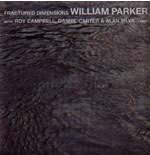|
|
 |
Dusted Reviews
Artist: Parker/Campbell/Carter/Silva Album: Fractured Dimensions Label: FMP Review date: Oct. 12, 2003 |

|
|
|
 |
One of the chief pleasures of creative improvised music is its infinite mutability. Extemporaneous expression insures that nothing ever sounds the same way twice. Even so, most bands working out of the idiom rely on familiarity and consensus as a means of creating cohesive work. Alter a band’s constitution or structure, and the wildcard results can be either revelatory or regrettable. Sometimes circumstance demands these sorts of 11th hour substitutions. Such was the case at the Total Music Meeting in Berlin during the fall of 1999 when Alan Silva pinch-hit for drummer Rashid Bakr in Other Dimensions in Music, a quartet also including bassist William Parker, multi-reedist/trumpeter Daniel Carter and brassman Roy Campbell.
Fractured Dimensions captures the band without Bakr and with Silva, but the music is far from broken and the contrast in ensemble sound is striking. Silva’s reemergence in the mid-90s, predominantly playing synthesizers in lieu of doublebass, created a polemical chasm amongst free jazz scenesters. There were those who lamented his switch to orchestral electronics. Others embraced the change, claiming that Silva’s skills on his signature instrument were severely diminished and even, in some circles, washed up. Wherever you might lie on the opinion continuum there’s no denying the energy and enthusiasm Silva puts into his music making regardless of the mouthpiece he chooses for articulation. The same holds true on this hastily organized outing.
Improvising over six tracks, varying in length from three and half minutes to ten times that span, the band covers a lot of sonic territory. Silva takes his role as new recruit seriously, testing out the tethers of habit that bind the regular band members and fraying them with adroitly placed shots from his keys. His part is often that of instigator and skeptic, causing his colleagues to constantly reevaluate their relationships and adapt to new methods of interaction. Placed in the potentially enveloping context of Silva’s Cyclopean synthesizer fields, Parker, the erstwhile helmsman and anchor, is forced to play for his life. Silva pushes his friend both dynamically and tonally and the effect is often thrilling, a tug-of-war between the acoustic and the electronic that shakes the resultant music to the core. Campbell and Carter are better suited to the situation, able to soar above Silva’s symphonic torrents in ways that the Parker’s throbbing pizzicato occasionally cannot.
All this description of dense sonorities is not to portray the program as noisily homogeneous onslaught. Each of the four players, and Carter and Campbell in particular, search for more tranquil spaces throughout. During the fleeting tone poem “Eternal Flower,” Carter’s gauzy alto smears across a languid surface of plucked bass and synth striations as Campbell’s softened brass injects warm legato notes. In sharp contrast, Silva sounds like Sun Ra during the closing minutes of the opening “Figures Standing in the Door,” stabbing out cachophonous slabs that take on the girth of cathedral-sized pipe organ swells. Piano enters the picture on “End of Famina,” dancing with Parker’s bass in a dark congruity of layered lines before an alien armada of electronics returns for another cyclonic spiral that reaches thermospheric heights. Each of these chapters unfolds as precursors to the disc’s centerpiece “Acrosses Rain,” an immense improvisation that emerges from cobwebbed harmonic catacombs into passages for dueling trumpets and shattered glass synth timbres. Across the space of a half hour, the four men wind and detour through a hypnotic range of colors and moods, once again divining the spirit of Ra in terms of sheer scope and size.
Nameless and transitory, this ensemble appears to have been purely a product of serendipity and necessity. Considering its impromptu origins, its members probably won’t be reuniting for future outings. Still, the document they left behind endures as a monument to the role of spontaneity as the principal midwife of successful improvised music.
By Derek Taylor
|







